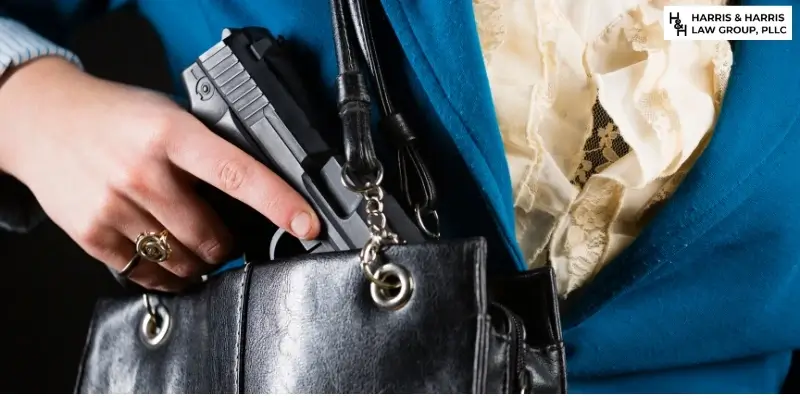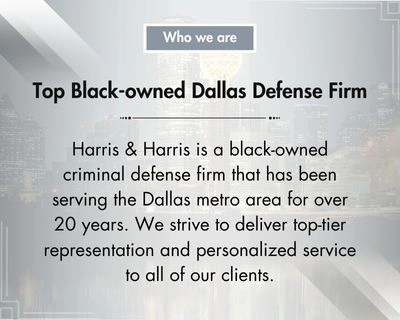Dallas Unlawful Carry of a Weapon Defense Lawyer

Dallas Unlawful Carry of a Weapon Defense Attorney
Being accused of unlawfully carrying a weapon can be an extremely distressing experience, especially when you understand the weight of the legal consequences. However, it’s important to remember that not all accusations will result in a guilty verdict. Everyone in Dallas has the right to defend themselves against these weapon allegations. If this has happened to you, hire a Dallas unlawful carry of a weapon defense lawyer as soon as you can. They can be a critical legal resource in your case.
At Harris & Harris Law Group, PLLC, we understand how serious the implications of these charges can be. It’s why we’re known for more than just defending cases. We craft compelling stories that persuasively highlight your side of the story. Our attorneys know that every unlawful carry allegation comes with its own set of facts to dig into, which is why we commit to exploring every legal avenue to defend your case as strongly as possible.
What Is the Most Common Reason for Inaccurate Allegations of Unlawful Weapons Carry?
Being accused of unlawfully carrying a weapon can happen for many different reasons, whether they are based on fact or not. The criminal justice system exists to prevent individuals from facing legal penalties without a proper investigation to see if they are warranted or not.
Some of the most common reasons for inaccurate allegations include:
Misinterpretation of Legal Expectations
Texas law provides specific circumstances for individuals to legally carry a weapon. For example, you are allowed to carry a firearm in your own vehicle, as long as it is concealed, or holstered. Sometimes, when allegations of unlawful carry arise, law enforcement does not look into these exceptions. This can lead to a premature charge, even when the person accused is within their legal rights.
Ambiguities in Evidence Collection
How evidence is gathered matters. In many cases, an incorrect method could contribute to inaccurate allegations. An officer who finds a firearm during a routine traffic stop may not have properly evaluated or recorded where it was located or accessed. For example, if there was a weapon locked in a glove compartment, this could be entirely legal. However, miscommunication on where it was found could lead to an inaccurate allegation.
Confusion Over Permit Requirements
While Texas does allow individuals over the age of 21 to carry a handgun without a permit in many situations, some restrictions still need to be followed. For example, there are certain locations, like schools, bars, and government buildings, where this is still prohibited. However, when exceptions like these exist, it makes it more likely that someone unfamiliar with the nuances of the law could inaccurately accuse someone of unlawful carry.
Bias or Assumptions by Law Enforcement
Some allegations are not clear violations, but rather assumptions made by a law enforcement officer. Officers often act on tips and observations without having enough time or resources to verify the facts, like what happens in court. In these cases, they may not have all the information they need to properly assess whether someone has criminal intent or a valid reason to be carrying the weapon. This can lead to an unwarranted arrest connected to their bias or assumption.
Lack of Awareness of Changing Laws
Gun laws are constantly evolving, and they especially have in recent years in Texas. The most significant change has been the introduction of constitutional carry. These changes can create confusion for both civilians and law enforcement, as not everyone is up to date with the latest regulations. This lack of awareness can create scenarios where an individual has been wrongfully accused of violating a law that is no longer enforced in the state.
FAQs About Dallas, TX Unlawful Carry of a Weapon Laws
Q: How Long Do You Go to Jail for Unlawfully Carrying Weapons in Texas?
A: The specific penalties assigned to anyone who has been caught unlawfully carrying a weapon in Dallas, Texas varies greatly on a case-by-case basis. The most standard offense in this category, a Class A misdemeanor, can result in up to one year in jail, accompanied by hefty fines. However, if the offenses happened in a restricted area, like on school grounds, this misdemeanor charge can be elevated to a felony.
Q: Are Defense Attorneys Part of Law Enforcement?
A: No, defense attorneys are not part of law enforcement. They are a separate aspect of our justice system who represent individuals who have been accused of crimes, like unlawfully carrying a weapon. Their role is to provide counsel, build legal defenses, and challenge evidence when presented by prosecutors. Being able to secure this type of impartial legal resource is a crucial component of the legal system, balancing the power of law enforcement and enabling everyone to receive due process.
Q: Can a Weapon Charge Affect Your Future Opportunities?
A: Yes, being found guilty of unlawfully carrying a weapon can have lasting consequences beyond the initial penalties issued. This can include difficulties with employment, challenges obtaining housing, and restrictions on owning firearms in the future. Professional licenses or security clearances can also be impacted. Addressing the charge proactively and seeking a dismissal or reduction with a defense lawyer can minimize the impact on your future.
Q: Why Do Weapon Charges Sometimes Get Dropped?
A: Weapon charges are sometimes dropped when there is not enough evidence available to support the prosecution’s claim or if a procedural error has been identified. For example, if law enforcement failed to follow proper search and seizure protocols, any evidence that was obtained could be thrown out. Similarly, if the defendant can prove they were lawfully carrying a weapon under an exception in Texas law, the case is less likely to hold up.
Contact Harris & Harris Law Group, PLLC, Today
If you have recently been accused of unlawfully carrying a weapon, you don’t have to face the situation alone. At Harris & Harris Law Group, PLLC, we can protect your rights and provide the quality defense you need to combat the allegations.
From day one, our team can apply our understanding of Texas weapon laws and lessons learned from our previous cases. Contact us today to learn more.


